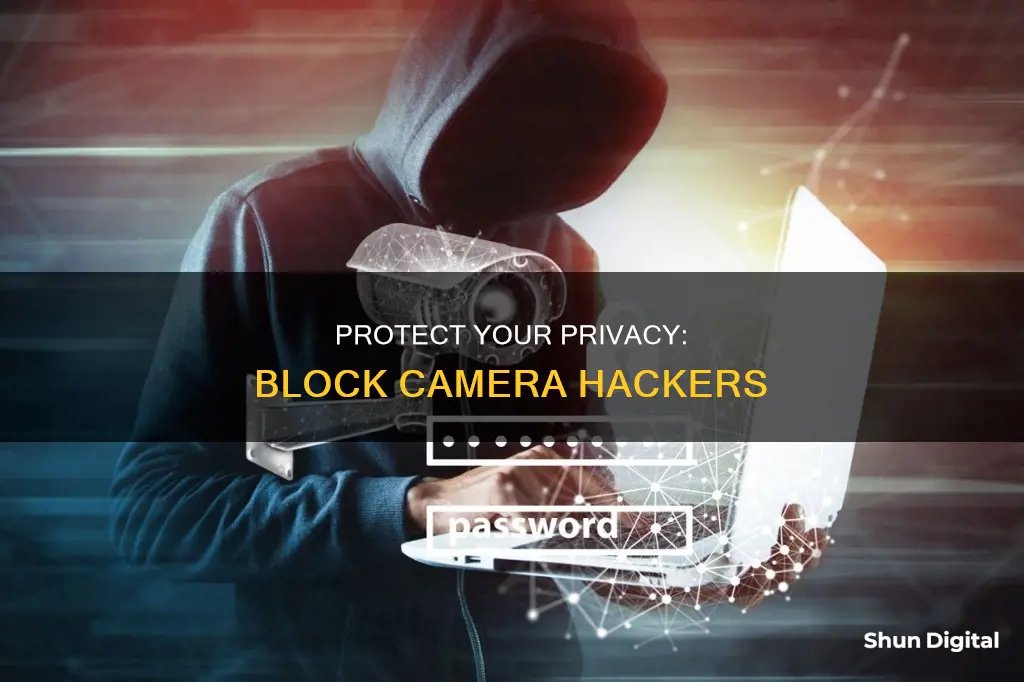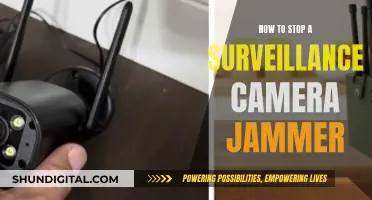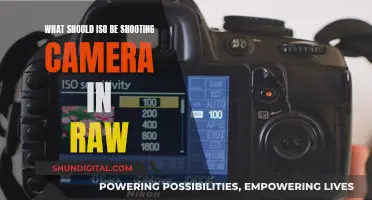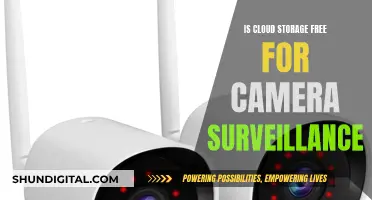
Webcam hacking, or camfecting, is when an unauthorized user accesses your webcam without your knowledge or consent. This can lead to security threats such as blackmail and identity theft. While it may sound like a hoax, it is a very real possibility, with even Mark Zuckerberg taking measures to cover his camera. Luckily, there are several ways to protect your webcam from being hacked.
| Characteristics | Values |
|---|---|
| Operating System | Keep it updated |
| Firewall | Lock down your network with a firewall |
| Passwords | Create strong passwords and don't reuse them |
| Webcam Covering | Cover your camera with tape, a sticker, or a sliding webcam cover |
| Suspicious Links | Avoid clicking on suspicious links |
| Personal Information | Don't share personal information |
| VPN | Use a virtual private network |
| Antivirus Software | Install antivirus software |
| Data Security | Look for companies that practice end-to-end encryption |
| Two-Factor Authentication | Enable two-factor authentication |
What You'll Learn

Use antivirus software to detect and remove viruses
To block unwanted access to your computer camera, you should use antivirus software to detect and remove any malicious viruses. Antivirus software is designed to scan your computer and detect any viruses or malware, removing them and keeping your webcam safe.
There are several antivirus software options available, many of which are free to download and use. These include Avast One, AVG AntiVirus FREE, and Microsoft's free online tool, the Microsoft Safety Scanner. These programs can detect and remove viruses and offer additional protection against future threats. Avast One, for example, can detect unusual app behaviour and alert you to any potential threats. AVG AntiVirus FREE runs quietly in the background, offering constant protection.
It is important to keep your chosen antivirus software up to date, so it can continue to detect and remove new and emerging threats. Most antivirus software will have automatic updates, which should be turned on.
In addition to using antivirus software, there are other measures you can take to protect your webcam from hackers. These include:
- Keeping your computer up to date with the latest security patches.
- Avoiding downloading random files or opening unexpected email attachments.
- Deleting suspicious emails that claim your webcam has been hacked and demand a ransom.
- Restricting permissions to your webcam, controlling which apps can access it.
- Covering your webcam when not in use.
T3 Batteries: Compatible with T5 Cameras?
You may want to see also

Keep your computer up to date to fix security issues
Keeping your computer updated is an essential step in preventing webcam hacking. Software updates often include security patches that fix vulnerabilities in your computer's security. Operating system updates are released frequently to patch security flaws and fix bugs. By updating your computer, you can prevent hackers from exploiting these vulnerabilities to gain access to your webcam.
To keep your Windows computer secure, make sure to turn on automatic updates in Windows Update. This will ensure that Windows, Microsoft Office, and other Microsoft applications are always up to date. You should also turn on automatic updates for non-Microsoft software, especially browsers, Adobe Acrobat Reader, and other apps you regularly use.
For iOS and Android devices, updates won't install automatically, but you will be notified when a new update is available. Make sure to install these updates as soon as possible to keep your device secure.
Additionally, keep your browser up to date. By default, Microsoft Edge, Firefox, and Chrome are configured to automatically update when your browser restarts. However, you should still check that automatic updates are enabled and configured correctly.
For other applications, regularly check for updates and configure automatic updating where possible. Instructions will vary depending on the application, so refer to the developer's documentation or website for specific instructions.
By keeping your computer up to date, you can fix security issues and make it more difficult for hackers to gain access to your webcam.
Unleashing Adobe Camera Raw: Editing Power for Photographers
You may want to see also

Avoid downloading random files and opening suspicious emails
One of the most common ways for hackers to gain access to your webcam is by tricking you into installing a virus on your device. This is often done through email attachments or files downloaded from the internet. Here are some tips to avoid downloading random files and opening suspicious emails:
- Be cautious when opening files from someone you don't know or that you weren't expecting. This includes email attachments, instant messaging file transfers, and downloads from the internet.
- Verify the file format: Malicious applications often disguise themselves as document or media files (such as PDFs, MP3s, or JPEGs). A malicious application disguised in this way is known as a "Trojan." Always check the file type before opening, especially if it has a suspicious file extension like .exe, .msi, or .dmg.
- Use antivirus software: Reputable antivirus software can detect and remove most viruses and protect your webcam and device. Keep your antivirus software up to date and regularly scan your device for potential threats.
- Keep your operating system and software updated: Regularly update your operating system and software to patch security vulnerabilities and prevent hackers from exploiting them to access your webcam. Enable automatic updates if available.
- Practice good password management: Create strong, unique passwords for your email and other accounts. Avoid clicking on suspicious links or providing personal information in emails, as this can lead to password breaches and potential access to your webcam.
- Be wary of phishing attempts: Scammers may send emails claiming that your webcam has been hacked and demand a ransom. Delete these emails immediately and run a full scan with your antivirus software to ensure your device's safety.
Understanding PIR Mode: How Your Camera Detects Motion
You may want to see also

Cover your webcam with tape or a sticker to block the view
Covering your webcam with tape or a sticker is a quick, easy, and inexpensive way to protect your privacy. It is also a good temporary solution if you are unable to remove malware from your device.
If you are looking for a quick fix, a strip of regular tape can obscure your surroundings enough so that no one can see what you are doing. However, it is not as dark as some other options, and it may not be obvious that you are covering your camera. For a more stylish solution, you can use washi tape, which comes in a variety of cute, decorative designs and is easy to remove.
If you want a fun fix, you can search online or in a craft store for a sheet of stickers with a darker base. You can place one over your webcam, and keep it on for as long as you like. Most stickers will leave behind a residue, so make sure you remove them slowly if you need to take them off.
You can also use invisible tape if you want a barrier that is not as dark as some other options. It will obscure your surroundings, but it may be hard to see, so you could forget it is there. Invisible tape can also be difficult to remove, and it may destroy the tape in the process.
If you are looking for a more sturdy option, you can rip off a small section of duct tape and centre it over your camera. This will block out any prying eyes, but it will likely leave a sticky residue on your camera, and it may even damage your webcam. Painter's tape is a great alternative if you don't want to leave a lot of residue.
While covering your webcam can protect your privacy, it is important to note that it will not stop hackers from accessing your device and stealing other information, such as passwords and data. Therefore, it is recommended to also follow good cyber hygiene practices, such as keeping your device updated, using antivirus software, and practising good password management.
Trail Camera Technology: How Are They Made?
You may want to see also

Unplug your webcam when not in use to prevent remote access
Unplugging your webcam when it's not in use is one of the most effective ways to prevent unwanted remote access. This simple measure ensures that even if a hacker gains access to your computer, they cannot activate your webcam as it's physically disconnected. This method is especially useful for external webcams that connect to your device via USB.
For those with built-in webcams on laptops or monitors, the next best option is to disable the camera in your device settings. In Windows, you can access the Device Manager to locate and disable your camera. On a Mac, you can go to System Preferences, select Security & Privacy, and then disable the camera under the Camera settings.
While these software measures are not foolproof, they add an extra layer of protection. Additionally, regularly updating your operating system and using antivirus software can help patch security vulnerabilities and remove potential malware.
However, the surest way to prevent webcam hacking is to physically disconnect or cover your camera when it's not in use. This could be as simple as placing a piece of tape or a sticky note over your webcam, ensuring your privacy.
LaView Camera's Private Mode: What You Need to Know
You may want to see also
Frequently asked questions
Use anti-virus software and keep your computer up to date with the latest security patches. Avoid downloading random files and opening suspicious emails, especially those with unsolicited attachments.
The camera indicator light might stay on even when you're not using it. New files may appear on your device, and your battery may drain faster than usual.
Disconnect or cover your webcam immediately and seek help from a qualified IT professional. Scan your computer for malware and change your passwords.
Cover your webcam with tape, a sticker, or a dedicated webcam cover when not in use. You can also disable camera access in your device settings or uninstall the webcam drivers.
Only download apps from official app stores and be wary of granting camera and microphone permissions. Use a virtual private network (VPN) to encrypt your network connection and protect your online communications.







